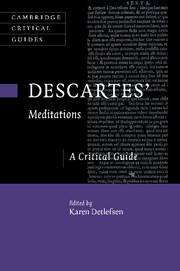Book contents
- Descartes’Meditations
- Series page
- Descartes’Meditations
- Copyright page
- Dedication
- Contents
- Contributors
- Acknowledgments
- Descartes’ texts
- Introduction
- Part I Skepticism
- Part II Substance and cause
- Chapter 3 Descartes against the materialists:
- Chapter 4 Thinking:
- Chapter 5 Causation and causal axioms
- Part III Sensations
- Part IV The human being
- Bibliography
- Index
Chapter 5 - Causation and causal axioms
from Part II - Substance and cause
Published online by Cambridge University Press: 05 February 2013
- Descartes’Meditations
- Series page
- Descartes’Meditations
- Copyright page
- Dedication
- Contents
- Contributors
- Acknowledgments
- Descartes’ texts
- Introduction
- Part I Skepticism
- Part II Substance and cause
- Chapter 3 Descartes against the materialists:
- Chapter 4 Thinking:
- Chapter 5 Causation and causal axioms
- Part III Sensations
- Part IV The human being
- Bibliography
- Index
Summary
- Type
- Chapter
- Information
- Descartes' MeditationsA Critical Guide, pp. 82 - 100Publisher: Cambridge University PressPrint publication year: 2012
- 1
- Cited by

